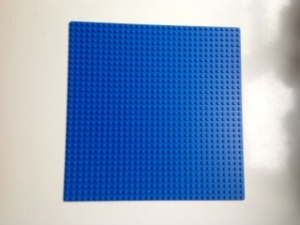With SpotOn London kicking off today, it’s time I revealed a few more details about our workshop scheduled for tomorrow afternoon, “Making Research Useful: The Consequences of (Bad) Communication“, perhaps better known by its hashtag, #solo13lego. The entire conference programme is being livestreamed, so feel free to follow, or even participate in, our session even if you can’t be there in person – keep an eye on the #solo13lego hashtag and join in the fun from afar. And if you are at SpotOn this year, then get thee to the British Library’s Eliot Room at 3:30pm on Saturday – we can accommodate up to fifty participants in the session itself (there’s only so much Lego to go around!), so you might want to be reasonably prompt arriving.
The workshop will look at some of the issues surrounding reproducibility in scientific research and in particular, the roles of the information user and information producer. And all through the wonderful medium of Lego: the perfect way to spend your Saturday afternoon 🙂 If you keep an eye on this blog, another post will be appearing at the start of the session tomorrow, explaining exactly what’s going on and providing the instructions you need for Lego building.
And yes, our workshop is one of the final items in the #solo13 programme. By this stage of the conference, you’ll have enjoyed lots of fantastic talks, seminars and workshops, but may also be flagging a little with all the activity. We want our #solo13lego workshop to combine thought-provoking discussion with the fun of playing with Lego. It should be a friendly session and hopefully a great way to close out your SpotOn 2013 experience – before the official Wrap Up, that is!
Just a few words of advice on the dress code: the wearing of shoes is strongly advised. To quote Michael Rosen, “you know what it’s like treading on Lego with your bare feet” 😉
And just in case you had any questions…
– Do I need to bring my own Lego to the session?
Don’t worry about that – we’ll be providing Lego kits for each team to use. If you can’t make it to the conference but would still like to take part in our session, then you’ll want to have a stash of Lego to hand. Each group in our session will be using a 32 x 32 backing board and a 650 piece Lego kit, which contains an assortment of basic bricks in several colours, including lots of those pesky 3×1, 2×1 and 1×1 pieces. So if you’re planning on remote participation, you don’t need to have any fancy Technic. Just a decent number of basic bricks will do.
– What’s going to happen at the session?
We’ll spend the first 5 minutes on a brief introduction to the reproducibility problem in modern science, before getting hands-on with Lego in groups, using some pre-prepared instructions designed to give you an awkward time. Each of our five groups will be given a different set of instructions to build the same item. Main rule is this: NO DISCUSSION is allowed between the groups. You can talk amongst your group all you like, but not to the other teams.
It’s not expected to be plain sailing all the way: our instructions are intentionally problematic and you may have to modify them as you go or fill in the blanks if you find any omissions. At the end of the Lego building phase, our groups will be critiquing the instructions and, if they get ahead of time, providing their own new-and-improved versions. We’ll have a quick-fire discussion of what aspects were difficult, where the various Lego recipes fell down, and identify what the fundamental problems were with the way the methods were communicated.
After the Lego building, we’ll take those newly-gained insights and open out the session into a debate on policy and approaches for how we train our scientists, researchers – in fact, any kind of knowledge workers – to deliver their outputs. Does modern culture focus too much on information production at the expense of information utility? If so, what can we do to change this: what incentives, penalties and support are needed?
– I want to participate remotely, how can I view the session?
Once you get to 3:30pm, check out the conference’s Livestream and follow our session that way. You may also want to visit Sophie’s Academia.edu profile – a slide deck will be appearing under Talks sometime on Saturday, so you should be able to access the talk materials there.
– I want to participate remotely, how will I get hold of the Lego instructions for the session?
Another post will appear here at “The Stilettoed Mathematician” just before 3:30pm on Saturday 9th November. It’ll link you to downloads for the Lego instructions so you can get building with everyone else. Remember, this session is all about the consequences of bad communication, so you should expect a bit of a tussle with the instructions as you go and you’ll need to use your ingenuity.
– Who’s running the session and how can I contact them?
There’s a team of two running the session, myself (Sophie Kay) and David Robert Grimes, science writer for the Guardian and Irish Times. Fire any questions at us over Twitter via the #solo13lego hashtag, or shout them directly to us at @StilettoFiend and @drg1985.


